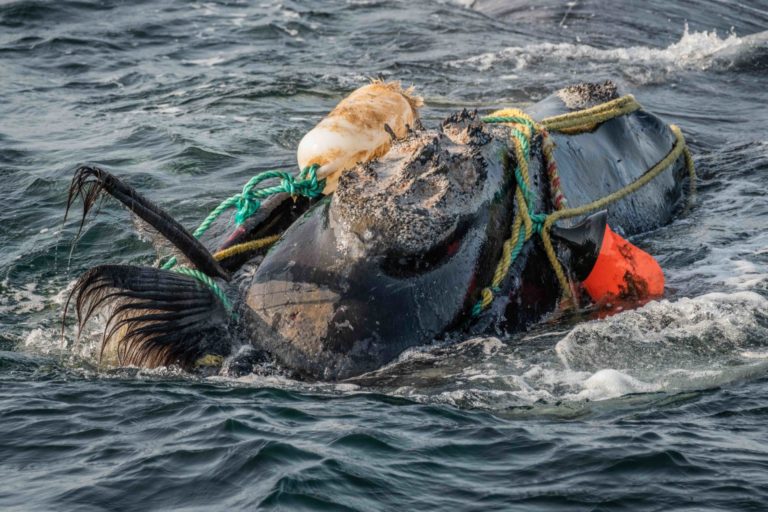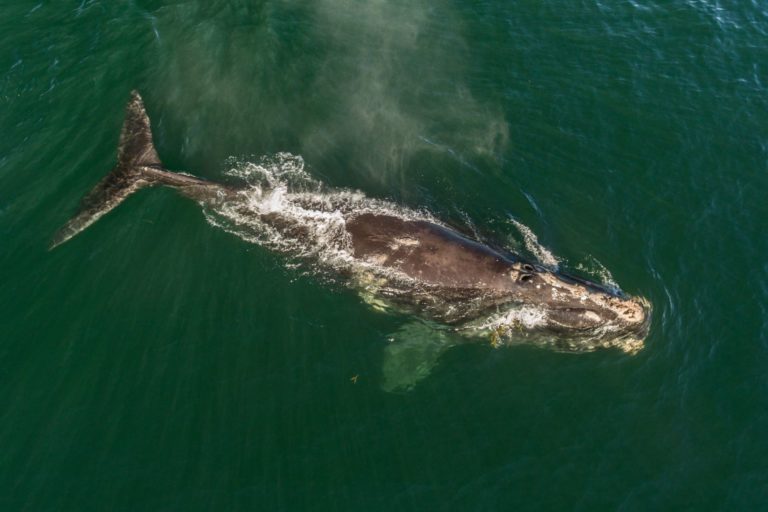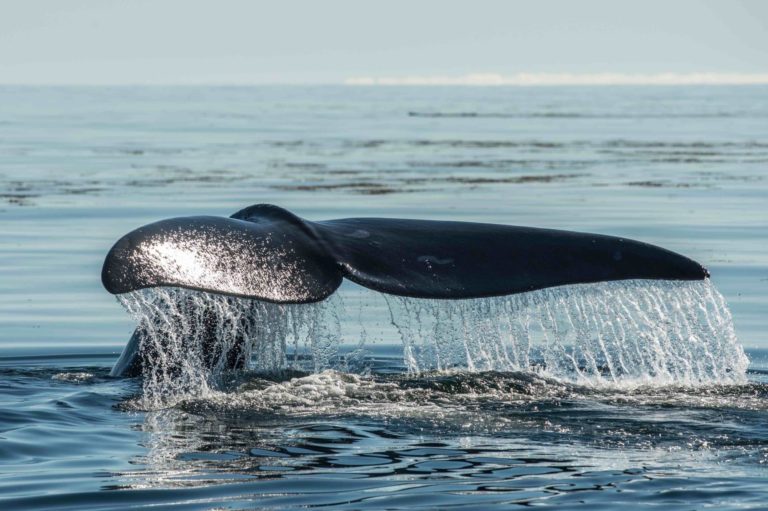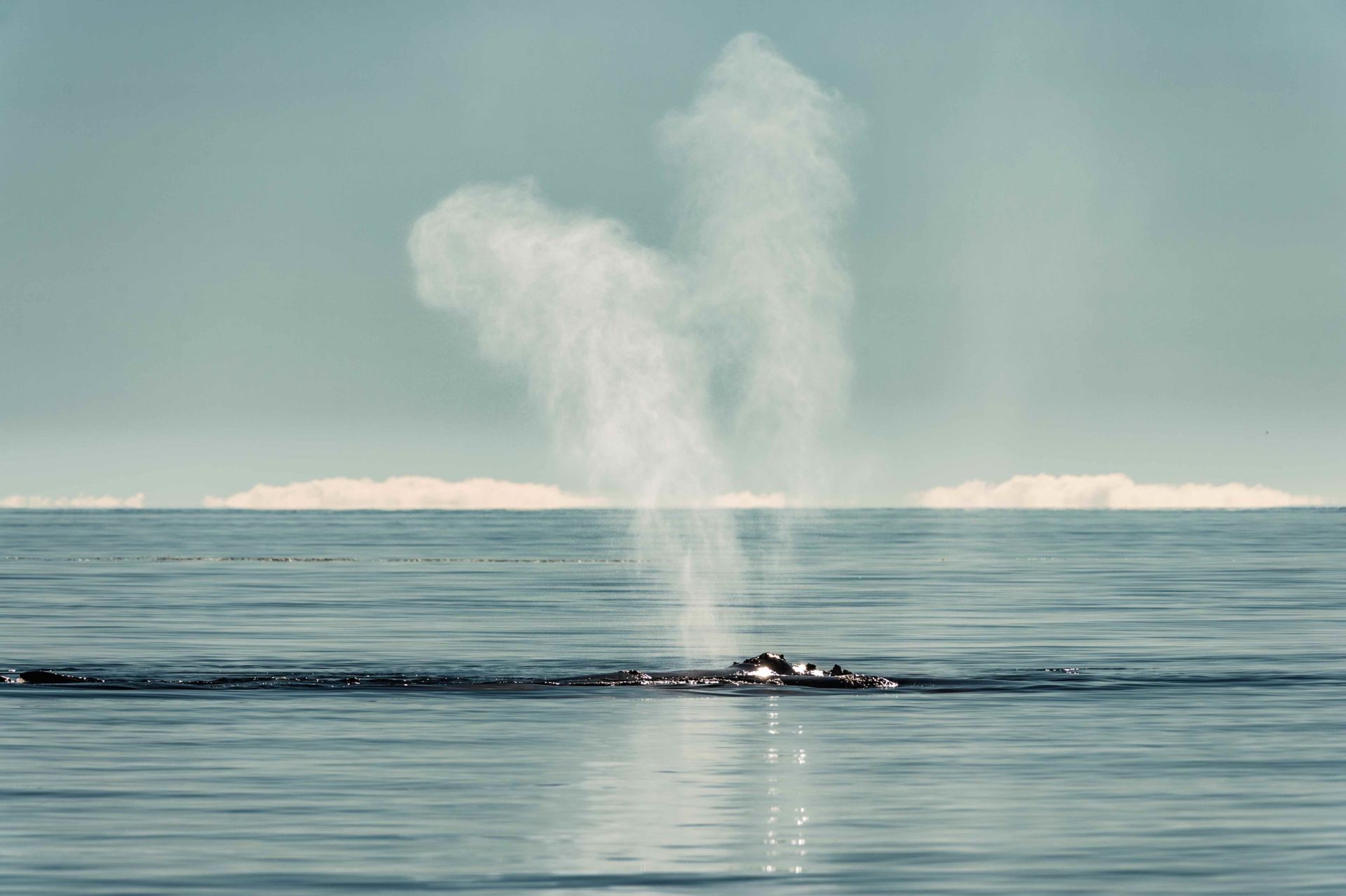The Case of the North Atlantic Right Whale
For thousands of years, the North Atlantic right whale has inhabited waters spanning from birthing grounds off the coasts of Florida and Georgia to feeding grounds in New England and Canada, areas heavy with intense vessel traffic and commercial fishing gear. Once numbering in the tens of thousands, the population has been decimated by vessel strikes and chronic entanglements in vertical buoy ropes connected to lobster and crab fishing traps. Just this week, a revised population estimate by the National Oceanic and Atmospheric Administration (NOAA) suggests fewer than 366 North Atlantic right whales remain (including fewer than 100 breeding females), giving this species the sad honor of being among the most critically endangered marine mammals on the planet.
Over the past two weeks alone, two severely entangled right whales, both juvenile males, have been spotted. The first, off the coast of New Jersey, is a four-year-old male and the calf of “Dragon,” one of the fewer than 100 remaining reproducing females, spotted earlier this year with life-threatening injuries of her own. Sadly, she too is presumed to die, a stark and grim reminder of the conservation crisis occurring right before our eyes. Scientists call this a “dead whale swimming,” as it may take months for the whale to succumb. The second entangled right whale, nicknamed “Cottontail,” was spotted off the coast of Nantucket, Massachusetts. Thankfully, Cottontail may indeed be saved as scientists and rescuers from IFAW and other partner organizations are monitoring for deployment as part of an at-sea rescue mission to cut the whale free from the ropes and gear dragging it to its death. Heroic efforts to disentangle whales from deadly gear continue, but even successful and certainly important, these interventions do not provide the critical long-term solution that this species so desperately needs.
Without immediate action, it is likely we will see this whale species go extinct in our lifetime — because of us.
More than 80% of right whales bear the scars of entanglement at least once in their lifetime, and entanglement in fishing gear accounts for 85% of diagnosed mortalities since 2010. IFAW wildlife veterinarian, Dr. Sarah Sharp, last year led a team of authors and scientists releasing a scientific paper in the journal “Diseases of Aquatic Organisms,” which identified that nearly 90% of documented North Atlantic right whale mortalities between 2003 and 2018 were a direct result of two anthropogenic causes — entanglement in fishing gear and vessel collisions. All the data indicate the loss of even one individual has devastating consequences on the species population at large.

Without immediate action, it is likely we will see this whale species go extinct in our lifetime — because of us. This death march is compounded by years of foot-dragging by the federal government who have failed to confront this crisis. Solutions are at hand to give these iconic whales a fighting chance. Strong conservation measures including seasonal closures of critical habitat areas to vertical buoy ropes, and support for state-of-the-art technologies such as ropeless fishing to enable lobsterman to access important fishing areas and earn their living without killing right whales. Now is the time for leadership. Now is the time for us all to recognize the ocean as a shared space.
Currently, IFAW is dedicated to addressing these critical issues head-on, engaging the fishing industry, scientists, legislators, technology companies and others to pioneer and accelerate the use of ropeless fishing gear. Ultimately, this “on-the-water” real-world technology would eliminate the number of fixed vertical buoy ropes currently in the water, thus ensuring safe passage of whales through migration corridors and into critical habitats. 21st century technology allows us all to forge a path towards sustainable long-term solutions — one where mankind and wildlife will not only coexist, but thrive together, free from the confines of the errant “either-or” mentality.

Alongside this effort, we are working with shipping companies to educate them on the importance of slow transit and speed restriction compliance, introducing mobile situational awareness tools including the Whale Alert mobile app, where mariners and the general public can locate whale “safety zones” and report sightings in real-time to ensure improved protection and minimize the possibility of vessel strikes.
We are also pushing our government and policy partners to pass critical marine legislation such as the “SAVE Right Whales Act,” a new grant program that would fund essential research and technology development to reduce both entanglements and vessel strikes, clearly identified as the greatest drivers of right whale mortality. And we are beginning to educate the consumer about the need for whale-safe seafood. Success will not be achieved without an engaged public that demands these options and the survival of this species, a public that embraces the fundamental change needed to ensure its continued existence.
If the natural world has taught us one thing, it is that if you remove the threats, species can rebound and flourish once again.
This iconic marine mammal is at a crossroads. As we have just been reminded in the past two weeks, this species cannot repopulate on its own, a victim of the visible and devastating results of human activities. If the natural world has taught us one thing, it is that if you remove the threats, species can rebound and flourish once again. It is incumbent on us to continue to take bold action together and face headfirst one of the most pressing conservation challenges of our time — removing the North Atlantic right whale from its current path towards extinction and placing it on a path towards recovery.

Editor’s Note: The opinions expressed here by Impakter.com columnists are their own, not those of Impakter.com. — In the Featured Photo: The unique v-shaped blow of a North Atlantic right whale (Eubalaena glacialis), one of the rarest of all marine mammal species. Bay of Fundy, Canada. Featured Photo Credit: Nick Hawkins











